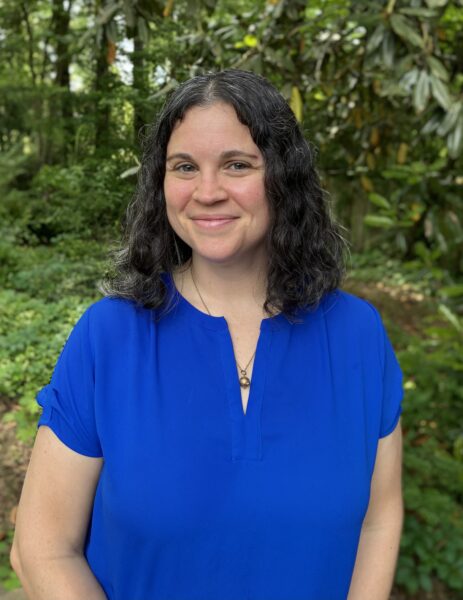Sarah Steinbock-Pratt is an associate professor at the University of Alabama. She lives in Tuscaloosa, Alabama, and has been a member since 2013.

Sarah Steinbock-Pratt
Alma maters: BA, McGill University, 2004; MA, Concordia University, 2006; PhD, University of Texas at Austin, 2013
Fields of interest: modern US, US empire, the US in the world, Pacific world, race and gender
Describe your career path. What led you to where you are today?
I benefitted from some truly amazing teachers of history in high school and at university. They showed me how amazing history was and helped me turn a love for stories into an appreciation of the complexities and contradictions of the past. I would not be an historian without them.
How have your historical interests evolved across your career?
I entered university thinking that I wanted to specialize in Tudor history. I entered graduate school thinking that I would become a presidential historian. Today, I am an historian of the US in the world, trans-Pacific empire and migration, and race and gender. So it’s important to make a good plan and stick to it.
What projects are you currently working on?
I am currently working on a monograph, tentatively titled “No Sitting on the Fence: Elizabeth Calloway’s Trans-Pacific and Transracial Migrations,” which explores Black migration and the creation of Black-Filipino communities across the Pacific in order to examine the nuanced processes of imperial, national, and racial formation in the first half of the 20th century.
What is your favorite historical site to visit?
I don’t know if this counts, but my favorite place that engages with history is the EJI’s museum and lynching memorial in Montgomery.
What’s the most fascinating thing you’ve ever found at the archives or while doing research?
While working on my current project, I was able to sleuth through footnotes to track down a copy of a Black newspaper published in Manila (that I thought was lost) held by a private collector. Meeting him, and seeing that paper which I thought had just been lost to history, was one of the greatest thrills of my career.
Who in your life served as a teacher or mentor and influenced your understanding of history?
There are so many wonderful teachers and scholars that encouraged and challenged me. Thomas McGurn, who taught AP European History at Albany High School: I wouldn’t be a historian without him. Edward Kohn at McGill University, who taught me to love US history (especially Theodore Roosevelt): I wouldn’t be a US historian without him. Graham Carr at Concordia University: without him, I never would have gotten into the PhD program at Texas. And Laurie Green and H.W. Brands at Texas, who encouraged and pushed me to become a better scholar. And so, so many others, who took the time to listen to me rabbit on about my work, gave me feedback, and provided good advice about the field.
What do you value most about the history discipline and community?
As my answer above indicates, at its best, history is a community of scholars (big-time nerds) who support and lift one another up. Most of us will never achieve fame or fortune, but we work diligently to preserve as honest and complete a picture of the past as we can possibly create.
Do you have a favorite experience with the AHA?
My first time going to the AHA was when I was on the job market in 2014. It was in DC, and it was cold and snowy, but it was so exciting. As I walked into the lobby of one of the main conference hotels, I saw hundreds of historians all around, all of us coming together, connected by our love of history. It was the moment that I really felt I was a part of community of scholars. I also got a job, which was a major relief!
AHA members are involved in all fields of history, with wide-ranging specializations, interests, and areas of employment. To recognize our talented and eclectic membership, Perspectives Daily features a regular AHA Member Spotlight series.
This work is licensed under a Creative Commons Attribution-NonCommercial-NoDerivatives 4.0 International License. Attribution must provide author name, article title, Perspectives on History, date of publication, and a link to this page. This license applies only to the article, not to text or images used here by permission.
